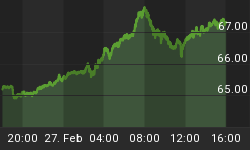Question: "I am a new reader, and I find your contrarian instincts quite refreshing. One question in regard to your bullish outlook into 2008/09. Are you concerned about the VXO? Price levels this low seemingly indicate complacency. I assume you read it differently. Why?"
Let me start by saying that I don't really consider the CBOE Volatility Index (VIX, VXO) a reliable indicator for trader sentiment and about the only value it has is at major market bottoms when it gets to 40 or above. This lets you know a bear market or serious decline is ending. But we're no longer in a bear market and we don't have a crash underway, so why should the low VIX reading matter right now?
If you go back and look at the long-term history of VIX and see how it performed in 1994 at the last 10-year cycle low, you will discover it was even lower in '94 and yet the following years of '95-'96 were bull market years! It didn't start shooting above the 40 level until 1997-1999 when we had all those mini-crashes (warning of the coming 2000-2002 bear market). Then once the bear market hit in 2000 the VIX consistently stayed at a relatively high level compared to the average levels of the mid-1990s. That's because bear markets tend to bring out volatility and higher levels of panic selling, which in turn causes the VIX/VXO to rise to higher levels.

We constantly hear talk from the bearish commentators that a low VIX means there is too much investor complacency, and that only a rise up to 40 or above means there is fear in the market. But does a low VIX/VXO reading necessarily mean investor complacency? Of course not, as a cursory examination of the past 10 years of VIX history will show. As we already mentioned, 1995 was a bull market year and the VIX never made it above 20. In 1996, another bull market year, the VIX never went above 30.
This summer all we heard in the financial press was investor obsession about the VIX. A couple of months ago I wrote a commentary on what I've been calling the "fear market." Out of the heavy response I got from this article, roughly 90-95% of the respondents mentioned VIX or VXO! I do not exaggerate; so many respondents actually mentioned the "complacent" VIX readings that I was completely blown away. In all the years I've been writing on finance, I don't think I've received more than a handful of e-mails or letters where VIX was mentioned, yet this summer everyone (and I do mean everyone!) was talking about it. This sounds too much like the bears were being piped (dis)information by some source(s) with intentions of making the bears get VERY bearish and sell short heavily. This in turn would put the market in a psychological/technical situation where it almost has to rally in meteoric fashion.
The 10-year cycle bottom is coming up. It's due to bottom by the first week of October. This lifting of pressure, coupled with the rising 12-year cycle (which bottomed in 2002), should produce a meaningful upward thrust for the broad market that will almost certainly strip the fur coats from off the bears. I predict it will result in the demise of some of the more famous long-time bearish commentators (whose names I don't have to mention). It will also confirm once and for all that the secular bear market ended in late 2002 (when the 12-year cycle bottomed) and that this is indeed a recovery bull market we're in -- one that should continue until later this decade.
In all my years in this business I've never seen the bears as bearish as they are now. One famous bearish newsletter writer has basically laid all his chips on the table by forecasting a major crash and depression to get underway before the year is over. Another has been predicting a "summer crash" that has yet to materialize. They are being set up for a big fall, and VIX is just one of the many "hooks" being used to get them in this frame of mind. Joe Granville used to say that indicators -- even reliable ones -- can sometimes be used as a "hook" by Wall Street insiders to get the public to go either bullish or bearish at the wrong time. Could it be that VIX/VXO is being used as a hook right now for the bears? Time will tell.
The bottom line is that one should always be suspicious whenever commentators start harping on the same indicator over and over and use it to "hang their hat" on when it comes to making a market forecast -- regardless of what the indicator happens to be.















